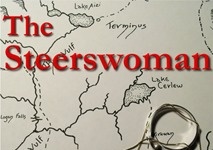Kameron Hurley, prize-winning SF newcomer and author of the highly successful Bel Dame Apocrypha series, posted a Christmas present to the science fiction community in the Perspectives section of Locus Magazine’s website, entitled “Making Excuses for Science Fiction,” which has attracted a lot of favorable comment since. Science fiction website io9.com actually linked to it under the title “The Can’t-Lose Secret to Making Anybody Want to Read Your SF Novel,” which strikes me as a sure-fire way to get any writer’s attention from any genre whatsoever. And as other writers have already pointed out, the post gives advice that’s applicable to authors in many other genres than science fiction.
 “The folks who hook me on their project are the folks who talk about the stories,” she says of her peers. “Not the backstory. Or the narrative experiment. Or the long, grinding history of their whole made-up world. No, it’s the folks who stick to the basics. It’s the folks who talk about the people.”
“The folks who hook me on their project are the folks who talk about the stories,” she says of her peers. “Not the backstory. Or the narrative experiment. Or the long, grinding history of their whole made-up world. No, it’s the folks who stick to the basics. It’s the folks who talk about the people.”
I have a problem with that. Not a big problem, but one worth registering. As Hurley concludes, ” stories are for everyone.” Yes, but they’re also by everyone. There’s no reason to look to science fiction for stronger storytelling over and above any other genre. Yes, any science fiction novel held together by a good strong story will likely garner appeal far outside its genre.
There are two reasons why I think Hurley’s remedy is open to question. One of them is a very legitimate and laudable quality of the genre. The other is the complete opposite.
The first is that science fiction is all about ideas. Time was those were just very hard-engineering ideas, like Larry Niven’s Ringworld. They’ve broadened out in all kinds of directions since, but the principle is the same. Ideas, not stories, are what drives a tale like Ringworld. The single defining phrase that covers much of science fiction is not “What happened next?” but “What if?” Concentrating on the stories doesn’t engage with that. And losing faith in your backstory or long grinding history is akin to losing faith in the ideas underpinning your story.
Ideas can actually be very effective foundations and drivers for stories. They might be the original conception that provides the entire setting and rationale for the story, like the Ringworld, or like M. John Harrison’s Viriconium. Or they might be the different points of view and mindsets whose interaction propels the narrative and gets worked out in the course of the action. If Thomas Mann could do it in The Magic Mountain, why can’t Harlan Ellison in “‘Repent, Harlequin!’ Said the Ticktockman”? And this particular genre works with ideas like no other – often at the expense of story, but none the less well for that.
Take J.G. Ballard’s The Atrocity Exhibition – one of the weirdest flowerings ever to erupt in the little walled garden of science fiction genre writing. No discernible story whatsoever. A series of surreal tableaux juxtaposed seemingly at random and bound together by common themes and obsessions far more than any narrative flow. And yet it’s still one of the best examples that the genre can hold up to say that it has climbed over its own ghetto walls and engaged with the whole of society and its time as serious literature, in a way that stories coming from any other point of origin could not. So it’s weird. It can also hold up its head in any company going. No need for excuses there.
The less appealing, and just as diagnostic, problem, though, is exactly what Hurley singles out when she talks about “not shame, but pride … elitism … of the, ‘People like me just get this and you won’t’ variety.” It’s the urge to tribalism, to geekspeak, technobabble, shared private languages. It’s the spoor of socially illiterate, usually adolescent personalities (of any calendar age) seeking to build their own fortress against the perceived scorn of the world and validate themselves within its walls. And yes, we’re all like that a bit.
But that becomes less excusable when it translates into real-world resentment and aggression against anyone who challenges the little cabal’s preconceptions and mores, or into cases where its shared values don’t quite stand up against broader communal values. Take, for instance, the widely publicized outbreaks of overt, virulent sexism (plus some not-so-discreet anti-semitism) among some of the veteran staffers of the Science Fiction Writers of America and their supporters. Or the molestation of cosplay girls and booth babes at science fiction conventions, along with often less visible but persistent harassment of female cosplayers and just plain gurl science fiction fans. That’s when ghetto values start to look a good deal more shabby and the walls a little too high.
Yet it’s that kind of mentality that drives too much of the science fiction world, especially its geek toy spinoffs. As with comic books, they’re the ones buying the toys and propelling the franchises and the marketing machines that become attached to the genre. Science fiction doesn’t need excuses for its basis, but it has some explaining to do about its followers.


































Sci Fi has lost its way: most of genre is FANTASY and “stories” are told over, mostly, 3+ volumes of 600 pages. Where are E.E. Smith, Asimov and John Campbell when we NEED THEM BAD.
I think the science fiction label is more important than Hurley will admit.
I belong to a book group that reads mostly mainstream fiction, but it came out the both the group moderator and I read science fiction and a number of people who have never read SF before wanted to give it a go. We picked Oryx and Crake as sort of a middle ground science fiction novel. The moderator told her “literary” friends the book group was going to read science fiction and got frowns of disapproval. She didn’t tell them the science fiction novel was by Atwood who would have been ok.
Around the same time I heard a science fiction podcast talking about the same novel and one of the regular participants declined to join the group because he didn’t think the book was science fiction. Bias is a two way street.
It’s deeper than just stories about people. Go figure.
Are people and the stories about them separable from ideas, culture and history? Outside of Sci-fi, these elements are there for the taking and fully formed. Inside Sci-fi, they have to be largely invented.
I think that this explains why really good Sci-fi is so much rarer.
The fact that the article has to explain what science-fiction can be surely proves that the genre needs defenders. Good sci-fi is every bit as worthwhile as literary fiction, yet is rarely treated as such. Authors and publishers of sci-fi often choose alternative labels (speculative fiction, techno thriller, cli-fi, whatever) as if embarrassed to call a story what is it. We need more people championing good sci-fi, if only to counter the automatic “frowns of disapproval”!